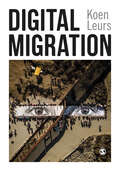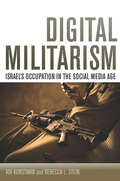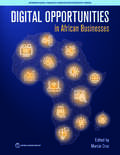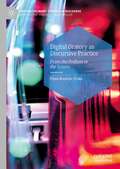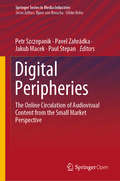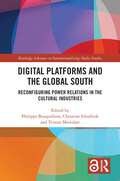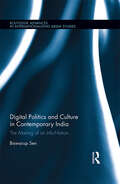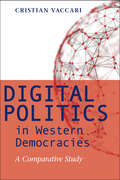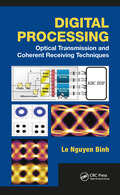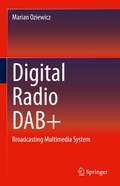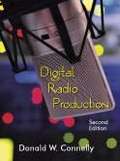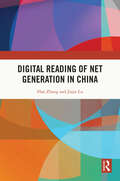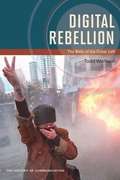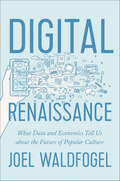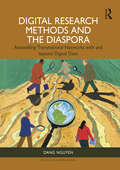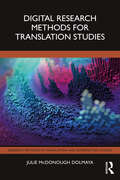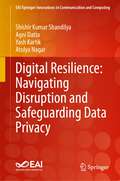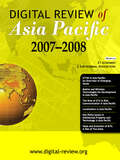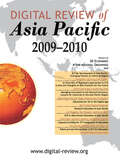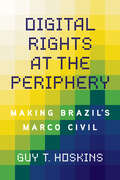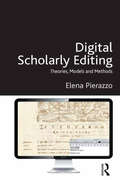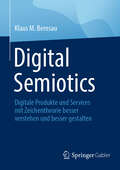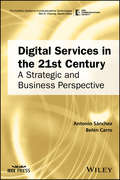- Table View
- List View
Digital Migration
by Koen Leurs"A revelation for digital researchers and a provocation for migration scholars… It introduces an insightful, inspiring, and inviting way of making sense of the messiness without losing hope of changing things." - Nishant Shah, Chinese University of Hong Kong "A must read for everyone who is concerned with questions of human mobility, media and communications and the digital border." - Myria Georgiou, LSE "A much-needed addition to scholarship on mobility, technology, and migration… The book is poised to become a touchstone text." - C.L. Quinan University of Melbourne In contemporary discussions on migration, digital technology is often seen as a ′smart′ disruptive tool. Bringing efficiencies to management, and safety to migrants. But the reality is always more complex. This book is a comprehensive and impassioned account of the relationship between digital technology and migration. From ′top-down′ governmental and corporate shaping of the migrant condition, to the ′bottom-up′ of digital practices helping migrants connect, engage and resist. Taking an interdisciplinary approach, Digital Migration explores: The power relations of digital infrastructures across migrant recruitment, transportation and communication. Migrant connections and the use of digital devices, platforms and networks. Dominant digital representations of migrants, and how they’re resisted. The affect and emotion of digital migration, from digital intimacy to transnational family life. How histories of pre and early-digital migration help us situate and rethink contemporary research. The realities of researching digital migration, including interviews with leading international researchers. Critical yet hopeful, Koen Leurs opens up the unequal power relations at the heart of digital migration studies, challenging us to imagine more just alternatives. Koen Leurs is an Associate Professor in Gender, Media and Migration Studies at the Graduate Gender Program, Department of Media and Culture, Utrecht University, the Netherlands. All author royalties for this book will be donated to the Alarm Phone, a hotline for boatpeople in distress.
Digital Militarism: Israel's Occupation in the Social Media Age
by Rebecca L. Stein Adi KuntsmanIsrael's occupation has been transformed in the social media age. Over the last decade, military rule in the Palestinian territories grew more bloody and entrenched. In the same period, Israelis became some of the world's most active social media users. In Israel today, violent politics are interwoven with global networking practices, protocols, and aesthetics. Israeli soldiers carry smartphones into the field of military operations, sharing mobile uploads in real-time. Official Israeli military spokesmen announce wars on Twitter. And civilians encounter state violence first on their newsfeeds and mobile screens. Across the globe, the ordinary tools of social networking have become indispensable instruments of warfare and violent conflict. This book traces the rise of Israeli digital militarism in this global context-both the reach of social media into Israeli military theaters and the occupation's impact on everyday Israeli social media culture. Today, social media functions as a crucial theater in which the Israeli military occupation is supported and sustained.
Digital Opportunities in African Businesses (International Finance Corporation Research Series)
by Marcio CruzAdoption of digital technologies is widely acknowledged to boost productivity and employment, stimulate investment, and promote growth and development. Africa has already benefited from a rapid diffusion of information and communications technology, characterized by the widespread adoption of mobile phones. However, access to and use of digital technology among firms is uneven in the region, varying not just among countries but also within them. Consequently, African businesses may not be reaping the full potential benefits offered by ongoing improvements in digital infrastructure. Using rich datasets, Digital Opportunities in African Businesses offers a new understanding of the region’s incomplete digitalization—namely, shortfalls in the adoption and effective use of digital technology by firms to perform productive tasks. The research presented here also highlights the challenges in addressing incomplete digitalization, finding that the cost of machinery, equipment, and software, as well as the cost of connectivity to the internet, is significantly more expensive in Africa than elsewhere. Digital Opportunities in African Businesses outlines ways in which the private sector, with support from policy makers, international institutions, and regulators, can help bring down these costs, stimulating more widespread digitalization of the region’s firms, thereby boosting productivity and, by extension, economic development. This book will be relevant to anyone with an interest in furthering digitalization across Africa. ------------------------------------------- It is clear that new digital technologies are opening up new opportunities for economic growth. But will African firms be able to take advantage of them? If so, how? To gain traction on these questions, we first need careful empirical research on what firms are currently doing, and rigorous thinking about what is getting in the way of greater adoption. This book delivers on both dimensions. It marries carefully collected new evidence with thoughtful, no-nonsense analysis of firm behavior and how markets are evolving. It is highly recommended reading for researchers and policymakers alike. — Eric Verhoogen, Professor of International and Public Affairs and of Economics, Columbia University
Digital Oratory as Discursive Practice: From the Podium to the Screen (Postdisciplinary Studies in Discourse)
by Fiona Rossette-CrakeThis book offers an appraisal of oratory, old and new, relating former discourse practice to a specific sub-set of contemporary, digital practices. The author explores the interface between language and society, providing an interdisciplinary study at the crossroads of discourse, linguistics, communication and rhetoric. The comparisons she draws are particularly pertinent in light of the steep rise in presentations given during video-conferences, webinars, and other online events during the COVID-19 pandemic, an event which accelerated previous moves towards digital communication and which is likely to have a long-term impact on communication styles. This book will be of interest to academics and students in fields including discourse analysis, applied linguistics, communication studies, digital studies and business studies.
Digital Peripheries: The Online Circulation of Audiovisual Content from the Small Market Perspective (Springer Series in Media Industries)
by Petr Szczepanik Pavel Zahrádka Jakub Macek Paul StepanThis is an open access book. Media industry research and EU policymaking are predominantly tailored to large (and, in the latter case, Western) European markets. This open access book addresses the specific qualities of smaller media markets, highlighting their vulnerability to global digital competition and outlining survival strategies for them. New online distribution models and new trends in the consumption of audiovisual content are limited by, and pose new challenges for, existing audiovisual business models and their legal framework in the EU. The European Commission’s Digital Single Market (DSM) strategy, which was intended e.g. to remove obstacles to the cross-border distribution of audiovisual content, has triggered a heated debate on the transformation of the existing ecosystem for European screen industries. While most current discussions focus on the United States, Western Europe, and the multinational giants, this book approaches these industry trends and policy questions from the perspective of relatively small and peripheral (in terms of their population, language, cross-border cultural flows, and financial and/or symbolic capital) media markets.
Digital Platforms and the Global South: Reconfiguring Power Relations in the Cultural Industries (Routledge Advances in Internationalizing Media Studies)
by Christine Ithurbide Tristan MattelartThis book addresses the issues raised by digital platforms in the Global South, with an emphasis on the cultural stakes involved. It brings together an interdisciplinary team of researchers – including political economists, socio-economists, geographers, media sociologists or anthropologists – who each explore these issues through an insightful case study at a local, national, regional or international scale. While studying the strategies of some of the main US-based Big Tech platforms or video streaming platforms towards the Global South, the chapters also consider the often-neglected active role local or regional actors play in the expansion of those Western digital players, and highlight the existence of a constellation of local or regional platforms that have emerged in Africa, Asia, Latin America or the Middle East. In addition to analysing the complex relationships of competition, collaboration or dependence between these diverse actors, this volume examines the ways in which the rise of these digital platforms has generated new forms of cultural entrepreneurship and participated in the reconfiguring of the conditions in which cultural contents are produced and circulated in the Global South. This volume will appeal to readers interested in the transnationalisation of cultural industries or in the social, political, economic, cultural and geopolitical dimensions of digital transformations and will be an important resource for students, teachers and researchers in media, communication, cultural studies, international relations and area studies programmes.
Digital Platforms and the Global South: Reconfiguring Power Relations in the Cultural Industries (Routledge Advances in Internationalizing Media Studies)
by Philippe Bouquillion Christine IthurbideThis book addresses the issues raised by digital platforms in the Global South, with an emphasis on the cultural stakes involved.It brings together an interdisciplinary team of researchers – including political economists, socio-economists, geographers, media sociologists or anthropologists – who each explore these issues through an insightful case study at a local, national, regional or international scale. While studying the strategies of some of the main US-based Big Tech platforms or video streaming platforms towards the Global South, the chapters also consider the often-neglected active role local or regional actors play in the expansion of those Western digital players, and highlight the existence of a constellation of local or regional platforms that have emerged in Africa, Asia, Latin America or the Middle East. In addition to analysing the complex relationships of competition, collaboration or dependence between these diverse actors, this volume examines the ways in which the rise of these digital platforms has generated new forms of cultural entrepreneurship and participated in the reconfiguring of the conditions in which cultural contents are produced and circulated in the Global South.This volume will appeal to readers interested in the transnationalisation of cultural industries or in the social, political, economic, cultural and geopolitical dimensions of digital transformations and will be an important resource for students, teachers and researchers in media, communication, cultural studies, international relations and area studies programmes.The Open Access version of this book, available at http://www.taylorfrancis.com, has been made available under a Creative Commons [Attribution-Non Commercial-No Derivatives (CC-BY-NC-ND)] 4.0 license.
Digital Politics and Culture in Contemporary India: The Making of an Info-Nation (Routledge Advances in Internationalizing Media Studies)
by Biswarup SenThe relationship between information and the nation-state is typically portrayed as a face-off involving repressive state power and democratic flows: Twitter and the Arab Spring, Google in China, WikiLeaks and the U.S. State Department. Less attention has been paid to those scenarios where states have regarded information and its diffusion as productive of modernity and globalization. It is the central argument of this book that the contemporary nation-state, especially in the global South, is far from hostile to the current informational milieu and in fact makes crucial use of it in order to develop adequate modes of governance, communication and sociality in a networked world. This book focuses on India – an emerging country that has recently witnessed a "software miracle" – to highlight the critical role informatics has historically played in the national imagination and to demonstrate how the state, private capital and civic society have drawn upon and engaged the precepts and protocols of the information age to fashion an "info-nation."
Digital Politics in Western Democracies: A Comparative Study
by Cristian VaccariA comparative analysis of political websites and their users from seven Western democracies.Digital politics is shorthand for how internet technologies have fueled the complex interactions between political actors and their constituents. Cristian Vaccari analyzes the presentation and consumption of online politics in seven advanced Western democracies—Australia, France, Germany, Italy, Spain, the United Kingdom, and the United States—from 2006 to 2010. His study not only refutes claims that the web creates homogenized American-style politics and political interaction but also empirically reveals how a nation’s unique constraints and opportunities create digital responses. Digital Politics in Western Democracies is the first large-scale comparative treatment of both the supply and the demand sides of digital politics among different countries and national political actors. It is divided into four parts: theoretical challenges and research methodology; how parties and candidates structure their websites (supply); how citizens use the websites to access campaign information (demand); and how the research results tie back to inequalities, engagement, and competition in digital politics. Because a key aspect of any political system is how its actors and citizens communicate, this book will be invaluable for scholars, students, and practitioners interested in political communication, party competition, party organization, and the study of the contemporary media landscape writ large.
Digital Processing: Optical Transmission and Coherent Receiving Techniques (Optics and Photonics)
by Le Nguyen BinhWith coherent mixing in the optical domain and processing in the digital domain, advanced receiving techniques employing ultra-high speed sampling rates have progressed tremendously over the last few years. These advances have brought coherent reception systems for lightwave-carried information to the next stage, resulting in ultra-high capacity global internetworking. Digital Processing: Optical Transmission and Coherent Receiving Techniques describes modern coherent receiving techniques for optical transmission and aspects of modern digital optical communications in the most basic lines. The book includes simplified descriptions of modulation techniques for such digital transmission systems carried by light waves. It discusses the basic aspects of modern digital optical communications in the most basic lines. In addition, the book covers digital processing techniques and basic algorithms to compensate for impairments and carrier recovery, as well as noise models, analysis, and transmission system performance.
Digital Radio DAB+: Broadcasting Multimedia System
by Marian OziewiczThis book describes the basic functions of the European Digital Radio DAB+ (Digital Audio Broadcasting plus) with its direct possible applications in a simple way. The book refers to fundamentals of DABs 80+ norms and specifications. Presented subjects are indicating problems of DAB signal propagation and possible multimedia applications. The book provides about 130 figures for explaining new concepts in an easy to approach manner. Applications include, but are not limited to audio compression MPEG, OFDM, SFN phasor representation, multiplexes, MOT, and conditional access. The book is intended for those interested in decisions regarding radio at various levels, owners of radio stations, and designers of various multimedia applications of digital radio in the field of security, students of wireless systems, etc. • Presents the fundamental functions of DAB / DAB+ (Digital Audio Broadcasting) along with its applications• Outlines the European Digital Radio system• Explains the functions of worldwide emerging digital radio subsystems
Digital Radio Production
by Donald W. ConnellyToday's broadcasting students need a well-balanced, hands-on, and relevant guide to the radio industry. Digital Radio Production provides exactly that, and more. Using a holistic approach, the author shares his 20 years of experience in the field and his extensive knowledge of sales, promotion, programming, announcing, and the web and their importance to the production person. Fully updated, the second edition enhances students' technical skills by providing easy-to-understand presentations regarding digital audio, recording, storage, manipulation, audio processing, and special effects. Helpful tips and invaluable insights on the production person's role in a radio station and a realistic approach of how to get a first job in radio are also highlighted.
Digital Reading of Net Generation in China
by Han ZHANG Jiajie LUWith the methodology of eye-tracking experiments, in-depth interviews and large-scale questionnaires across cities, this book provides a panoramic vision of digital reading and social interaction among the new generations in China. Growing up under the background of social transformation, cultural integration and technological progress, digital reading of the Chinese net generation presents complex characteristics. People born in the 1980s and 90s are better educated, have democratic consciousness, and have strong motivations for self-expression. Meanwhile, reading behaviours affect their content production, virtual identities, and socialization in the real world. The immense need for digital content fuels the digital reading industries. Internet literature, social media articles, reading APPs and e-reader devices have also benefited from media content and interface innovation in the market. This book provides a solid scientific foundation for reading promotion and guiding strategies in the context of digital media and offers empirical evidence for policy formulation of reading promotion and spiritual civilization in the digital age. The authors expand the perspective of communication studies on digital reading and analyze how the youth reads on digital devices and creates content for interest or profit. The book will be a great read for students and scholars of mass communication, media studies and digital publishing.
Digital Rebellion: The Birth of the Cyber Left
by Todd WolfsonDigital Rebellion examines the impact of new media and communication technologies on the spatial, strategic, and organizational fabric of social movements. Todd Wolfson begins with the rise of the Zapatistas in the mid-1990s, and how aspects of the movement--network organizational structure, participatory democratic governance, and the use of communication tools as a binding agent--became essential parts of Indymedia and all Cyber Left organizations. From there he uses oral interviews and other rich ethnographic data to chart the media-based think tanks and experiments that continued the Cyber Left's evolution through the Independent Media Center's birth around the 1999 WTO protests in Seattle. After examining the historical antecedents and rise of the global Indymedia network, Wolfson melds virtual and traditional ethnographic practice to explore the Cyber Left's cultural logic, mapping the social, spatial and communicative structure of the Indymedia network and detailing its operations on the local, national and global level. He also looks at the participatory democracy that governs global social movements and the ways the movement's twin ideologies, democracy and decentralization, have come into tension, and how what he calls the switchboard of struggle conducts stories of shared struggle from the hyper-local and dispersed worldwide. As Wolfson shows, understanding the intersection of Indymedia and the Global Social Justice Movement illuminates their foundational role in the Occupy struggle, Arab Spring uprising, and the other emergent movements that have in recent years re-energized radical politics.
Digital Renaissance: What Data and Economics Tell Us about the Future of Popular Culture
by Joel WaldfogelHow digital technology is upending the traditional creative industries—and why that might be a good thingThe digital revolution poses a mortal threat to the major creative industries—music, publishing, television, and the movies. The ease with which digital files can be copied and distributed has unleashed a wave of piracy with disastrous effects on revenue. Cheap, easy self-publishing is eroding the position of these gatekeepers and guardians of culture. Does this revolution herald the collapse of culture, as some commentators claim? Far from it. In Digital Renaissance, Joel Waldfogel argues that digital technology is enabling a new golden age of popular culture, a veritable digital renaissance.By reducing the costs of production, distribution, and promotion, digital technology is democratizing access to the cultural marketplace. More books, songs, television shows, and movies are being produced than ever before. Nor does this mean a tidal wave of derivative, poorly produced kitsch; analyzing decades of production and sales data, as well as bestseller and best-of lists, Waldfogel finds that the new digital model is just as successful at producing high-quality, successful work as the old industry model, and in many cases more so. The vaunted gatekeeper role of the creative industries proves to have been largely mythical. The high costs of production have stifled creativity in industries that require ever-bigger blockbusters to cover the losses on ever-more-expensive failures.Are we drowning in a tide of cultural silt, or living in a golden age for culture? The answers in Digital Renaissance may surprise you.
Digital Research Methods and the Diaspora: Assembling Transnational Networks with and Beyond Digital Data
by Dang NguyenThe computational turn in the social sciences and humanities has generated much excitement about the potential to refresh our approaches to the study of the techno-social. From natively digital to digitised data, researchers of digital diasporas increasingly find themselves working with a range of disparate digital objects. These digital objects can include anything from hyperlink to timestamps, from platform behavioural metrics such as react, share, or retweet to different media formats such as text, image, pre-recorded or livestreamed videos. Taking these disparate objects into account, this book introduces digital methods as research strategies not only for dealing with the ephemeral and unstable nature of tracing the diaspora with digital data, but also for reconceptualizing digital diasporas as assemblages and networks of more-than-human actors. The book also introduces a range of theoretical perspectives and methodological techniques to studying digital diasporas as contingent and processual hybrid collectives of heterogeneous material, cultural, and practice-based assemblages. This book will be essential reading for students and scholars interested in the digital space and transnational communities.
Digital Research Methods for Translation Studies (Research Methods in Translation and Interpreting Studies)
by Julie McDonough DolmayaDigital Research Methods for Translation Studies introduces digital humanities methods and tools to translation studies. This accessible book covers computer-assisted approaches to data collection, data analysis, and data visualization and presentation, offering authentic examples of these approaches in both translation studies research and projects from related fields. With a diverse range of examples featuring various contexts and language combinations to ensure relevance to a wide readership, this volume covers the strengths and limitations of computer-assisted research methods, as well as the ethical challenges specific to this kind of research. This is an essential text for advanced undergraduate and graduate translation studies students, as well as researchers looking to adopt new research methods.
Digital Resilience: Navigating Disruption and Safeguarding Data Privacy (EAI/Springer Innovations in Communication and Computing)
by Atulya Nagar Shishir Kumar Shandilya Agni Datta Yash KartikThis book offers an in-depth overview of digital resilience, defined as the ability of individuals, organizations, and societies to adapt to and counter various digital threats such as cyberattacks, data breaches, and other forms of cyber threats. Digital resilience not only enables proactive measures but also ensures fault-tolerant planning and design. The book elaborates on the necessary techniques and methods to achieve digital resilience. Key methodologies, including quantum computing, post-quantum cryptography, nature-inspired cybersecurity, zero-trust systems, zero-knowledge proofs, multi-party computation, and the emerging field of space security, are discussed in detail. The book provides insights into artificial intelligence and machine learning, examining their impact on society and organizations. It critically analyses the role of cybersecurity in businesses, emphasizing its importance for safety and economic stability. In addition, the book discusses notable cyber incidents, offering valuable insights into digital resilience. It serves as a comprehensive compilation, featuring key terms, definitions, case studies, and references to existing literature and research in cybersecurity, analytics, information sciences, future computing, digital resilience, and related fields.
Digital Review of Asia Pacific 2007/2008
by IdrcThe biennial Digital Review of Asia Pacific is a comprehensive guide to the state-of-practice and trends in information and communication technologies for development (ICT4D) in Asia Pacific This third edition (2007-2008) covers 31 countries and economies, including North Korea for the first time. Each country chapter presents key ICT policies, applications and initiatives for national development. In addition, five thematic chapters provide a synthesis of some of the key issues in ICT4D in the region, including mobile and wireless technologies, risk communication, intellectual property regimes and localization. The authors are drawn from government, academe, industry and civil society, providing a broad perspective on the use of ICTs for human development.
Digital Review of Asia Pacific 2009-2010
by Shahid Akhtar and Patricia ArintoThe biennial Digital Review of Asia Pacific is a comprehensive guide to the state-of-practice and trends in information and communication technologies for development (ICTD) in the Asia Pacific region. This fourth edition (2009-2010) features 30 economies and four sub-regional groupings. The chapters provide updated information on ICT infrastructure, industries, content and services, key programs, enabling policies and regulation, education and capacity building, open source, and research and development initiatives, as well as ICTD challenges in each of the economies covered. The common framework that underpins these reports allows readers to undertake a comparative analysis and assess progress across Asia Pacific. In addition, regional overviews provide a synthesis of ICTD trends, regulatory issues, and lessons for managing innovation in the network economy. The thematic chapters focus on issues in ICT in education, a key area in ICTD. The authors are drawn from government, academe, industry and civil society, providing a broad perspective on the use of ICTs for human development.
Digital Rights at the Periphery: Making Brazil's Marco Civil (Geopolitics of Information)
by Guy T. HoskinsSigned into law in 2014, the Marco Civil da Internet (Brazilian Civil Rights Framework for the Internet) appeared to offer pioneering legislation for a digital bill of rights that addressed issues like network neutrality and privacy. Guy T. Hoskins chronicles the Marco Civil’s development and its failure to confront the greatest concentration of power in the digital age: informational capitalism. Combining interviews with discourse and political-economic analysis, Hoskins reveals why the legislation fell short while examining the implications of its emergence in Brazil, which remains on the margins of the global system of informational capitalism. Hoskins places collectivist and public service principles at the core of any framework’s effectiveness. He also shows why we must create systems sensitive to the sociocultural and political-economic contexts that will shape digital rights and their usefulness. Compelling and contrarian, Digital Rights at the Periphery looks at communications policy and internet governance in the Global South and the lessons they provide for the rest of the world.
Digital Safety in Railway Transport—Aspects of Management and Technology (Springer Series in Reliability Engineering)
by Adam Jabłoński Marek JabłońskiThis book introduces modern safety management in rail transport, focusing on the challenges resulting from the digital economy. It details how the cybersecurity of railway technical systems and risk can be managed. The rail transport sector is increased integrated into the digital economy. Ensuing the safety of technical systems and managing the rail system as a whole are key challenges for rail transport designers, managers, users and other stakeholders. Developing of rail transport based on the interoperability of different systems requires both searching for modern solutions and ensuring a high level of standardization of processes. In the context of the widespread digitalization of railway systems, new hazards arise that can lead to undesirable events. This book examines these issues. The book will be of interest to rail professionals, and researchers into transport systems and reliability.
Digital Scholarly Editing: Theories, Models and Methods (Digital Research in the Arts and Humanities #Vol. 4)
by Elena PierazzoThis book provides an up-to-date, coherent and comprehensive treatment of digital scholarly editing, organized according to the typical timeline and workflow of the preparation of an edition: from the choice of the object to edit, the editorial work, post-production and publication, the use of the published edition, to long-term issues and the ultimate significance of the published work. The author also examines from a theoretical and methodological point of view the issues and problems that emerge during these stages with the application of computational techniques and methods. Building on previous publications on the topic, the book discusses the most significant developments in digital textual scholarship, claiming that the alterations in traditional editorial practices necessitated by the use of computers impose radical changes in the way we think and manage texts, documents, editions and the public. It is of interest not only to scholarly editors, but to all involved in publishing and readership in a digital environment in the humanities.
Digital Semiotics: Digitale Produkte und Services mit Zeichentheorie besser verstehen und besser gestalten
by Klaus M. BernsauDieses Buch erklärt, wie Unternehmen mit Hilfe der Semiotik – der Lehre von den Zeichen – ihre digitalen Produkte und Dienstleistungen erfolgreicher machen können. Denn die Wellness-App, der Warenkorb im Onlineshop oder der Like-Button in der Produktansicht haben eines gemeinsam: Sie basieren auf digitalen Zeichen. Diese kundengerecht einzusetzen, wird immer mehr zum Schlüssel für das Produkterlebnis und damit zur Voraussetzung für den Produkterfolg. Die moderne Semiotik verbindet Sprachwissenschaft, Erkenntnistheorie, Anthropologie, Psychologie und Sozialwissenschaften zu einem faszinierenden Blick auf digitale Angebote. Der Autor zeigt, wie Unternehmen diese Erkenntnisse nutzen können und liefert ein praxisnahes Buch für Produktmanager*innen, Marketer*innen, Kommunikator*innen, Designer*innen, Softwareentwickler*innen – kurz: für alle, die für digitale Produkte und Dienstleistungen verantwortlich sind.
Digital Services in the 21st Century: A Strategic and Business Perspective
by Antonio Sánchez Belén CarroTelecommunication Services provides a holistic approach to understand telecommunications systems by addressing the emergence and domination of new digital services, consumer and economic dynamics, and the creation of content by service providers. Includes services, underlying technologies, and internal capabilities for social network advertising Covers market dynamics that determine the successes and failures of service offerings Discusses the impact of smartphones (iPhone launch) on the telecommunications and mobile device industry
